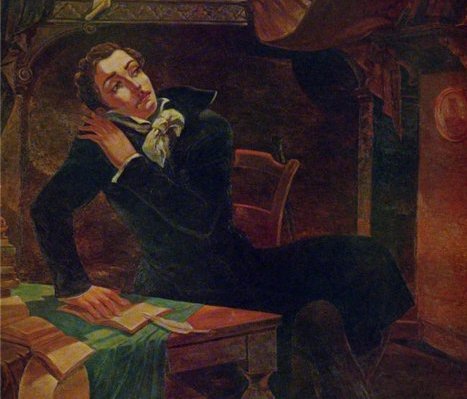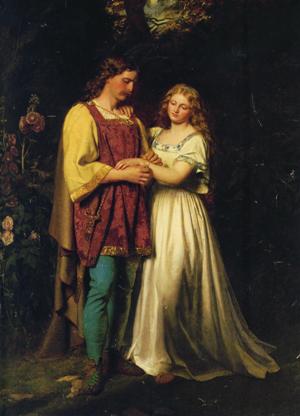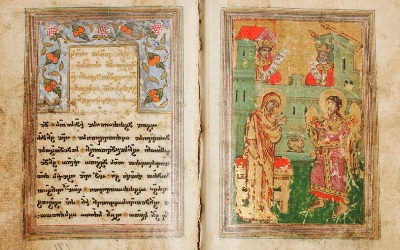

|
The Kartvelologist The Kartvelologist” is a bilingual (Georgian and English) peer-reviewed, academic journal, covering all spheres of Kartvelological scholarship. Along with introducing scholarly novelties in Georgian Studies, it aims at popularization of essays of Georgian researchers on the international level and diffusion of foreign Kartvelological scholarship in Georgian scholarly circles. “The Kartvelologist” issues both in printed and electronic form. In 1993-2009 it came out only in printed form (#1-15). The publisher is the “Centre for Kartvelian Studies” (TSU), financially supported by the “Fund of the Kartvelological School”. In 2011-2013 the journal is financed by Shota Rustaveli National Science Foundation. |
Nikoloz Baratashvili Poems
In this issue of the journal, three of Baratashvili’s best known poems are published: Sky Blue (translated by Donald Rayfield: The Literature of Georgia. A History. Carzon). Meditations by the river Mtkvari and Merani (translated by Venera Urushadze.Anthology of Georgian Poetry, Tbilisi 1958). The Georgian text is published as cited in the edition by Pavle Ingorokva (Nikoloz Baratashvili. Works, 1959). The Editor keywords:Meditations By the River Mtkvari, Merani, The Blue Sky Category: GEORGIAN LITERATURE IN ENGLISH TRANSLATION Authors: Nikoloz Baratashvili Imogen or Innogen – Concerning One Conjecture of Shakespeare’s Cymbeline’s Oxford Publication
One theme, pointed out in these publications, a parallel study of the main literary characters of the MPS and Cymbeline, has prompted me to realize the significance of those symbolic meanings, which, in certain cases, were used by the great playwright when selecting the names of his characters. From this point, the name of the king’s only daughter Imogen, being the protagonist of Cymbeline, is also worth noting. The present study is dedicated to the interpretation of the symbolic meaning of the name Imogen as well as the acceptability of its modified version – Innogen in some publications of the play. keywords:The Man in the Panther Skin, Cymbeline, Imogen, Innogen Category: SCHOLARLY STUDIES Authors: ELGUJA KHINTIBIDZE Georgian - Icelandic Literary Relations
What are the literary relations between two small countries, like Georgia and Iceland, which are very far one from each other, with very different languages, cultures and histories? Despite the great distance and the differences between those two cultures, some literary contacts between Georgia and Iceland exist. Although my research shows that the literary contacts started first in the 20th century, numerous works have been translated. This article is focused on the literary relations between Georgia and Iceland in the fields of translation of literary fiction and the reception of those translations in both countries. keywords:Literary contacts; Georgia; Iceland; Icelandic sagas; Halldór Laxness Category: SCHOLARLY STUDIES Authors: Michaela Krejčová The Women of Renaissance. Imogen and Nestan
The attitude of the Middle Ages and Renaissance regarding women gender is revealed in the present article. It is also discussed the literary image of the protagonist woman – Imogen in Shakespeare’s latest play Cymbeline. The fact that Imogen’s literary image shows some parallel lines with the main woman character of The Man in the Panther Skin is also revealed by the author. keywords:Renaissance, Women, Rustaveli, Imogen, Nestan Category: SCHOLARLY STUDIES Authors: Tamar Melikidze
Georgian naxiri (cattle) - Akkadian naxiru
In the present article, an attempt is made to reveal a precise meaning of the word naxiru which, although referring to several animals, has not yet been defined. By analysing a number of arguments including the Georgian word naxiri (a herd) it is argued that this word in Assyrian sources denoted a sea cow. keywords:naxiru, naxiri (a herd), a sea cow, a seahorse, Assyrian sources Category: SCHOLARLY STUDIES Authors: Constantine B. Lerner The Borrowed Plant Name Stems in the Georgian Gospel
keywords:Borrowed Vocabulary; Plant Names; Georgian Gospel Category: SCHOLARLY STUDIES Authors: Marine Ivanishvili |
Categories Journal Archive |



 Nikoloz Baratashvili (1817-1845) is the greatest representative of Georgian Romanticism. His poetry has not been fully translated into English.
Nikoloz Baratashvili (1817-1845) is the greatest representative of Georgian Romanticism. His poetry has not been fully translated into English. The principal novelty of the last decade in Rustaveli Studies, revealing the fact that the love story of the main characters in the MPS – Nestan and Tariel was used as a plot source in early 17th century English dramaturgy, has become a frequent topic of The Kartvelologist’s publications (The Kartvelologist, #14, 15, 16, 19, 20).
The principal novelty of the last decade in Rustaveli Studies, revealing the fact that the love story of the main characters in the MPS – Nestan and Tariel was used as a plot source in early 17th century English dramaturgy, has become a frequent topic of The Kartvelologist’s publications (The Kartvelologist, #14, 15, 16, 19, 20).  Cultural historians and archeologists assume as undeniable fact the relationship between the Caucasus and the Middle East already in VI-V centuries BC, especially between the countries of the South Caucasus and the Middle East. As is known with confidence, the Caucasus had been a carrier and propagator, Kulturträger, of the ancient civilization’s achievements in the whole Caucasus. Against this background, it is natural to expect the existence of the traces of the ancient areal contacts in the Kartvelian languages. The phonetic and semantic modifications of the borrowed foreign lexical units are interesting and need to be taken into account for the study of the source language as well as of the borrowing language systems, for clarification of certain scientific facts. In this regard, the Georgian Gospel represents an extremely important source of information. According to the purpose of our research a few basic questions arise: how are the plant names transferred to Georgian Gospel texts – via borrowing, translation, transliteration, loan-words, or replacing by the equivalents of the similar semantics? Are there any Proto-Kartvelian roots among the plant names recorded in Gospels? Are there any examples when with the borrowed vocabulary, we also come across with the Georgian (Kartvelian) synonym forms? Did the borrowed material appear in the Georgian language system by way of Gospel texts translation, or did it exist before? Which cultural, religious motives are related to each plant name in the given context? How are the Kartvelian and borrowed roots distributed (for example, depending on whether the plant grows in Georgia or not)? How adequate are the lexical equivalents and how are the errors explained? - We shall try to answer these questions this time using the examples of the borrowed vocabulary.
Cultural historians and archeologists assume as undeniable fact the relationship between the Caucasus and the Middle East already in VI-V centuries BC, especially between the countries of the South Caucasus and the Middle East. As is known with confidence, the Caucasus had been a carrier and propagator, Kulturträger, of the ancient civilization’s achievements in the whole Caucasus. Against this background, it is natural to expect the existence of the traces of the ancient areal contacts in the Kartvelian languages. The phonetic and semantic modifications of the borrowed foreign lexical units are interesting and need to be taken into account for the study of the source language as well as of the borrowing language systems, for clarification of certain scientific facts. In this regard, the Georgian Gospel represents an extremely important source of information. According to the purpose of our research a few basic questions arise: how are the plant names transferred to Georgian Gospel texts – via borrowing, translation, transliteration, loan-words, or replacing by the equivalents of the similar semantics? Are there any Proto-Kartvelian roots among the plant names recorded in Gospels? Are there any examples when with the borrowed vocabulary, we also come across with the Georgian (Kartvelian) synonym forms? Did the borrowed material appear in the Georgian language system by way of Gospel texts translation, or did it exist before? Which cultural, religious motives are related to each plant name in the given context? How are the Kartvelian and borrowed roots distributed (for example, depending on whether the plant grows in Georgia or not)? How adequate are the lexical equivalents and how are the errors explained? - We shall try to answer these questions this time using the examples of the borrowed vocabulary.